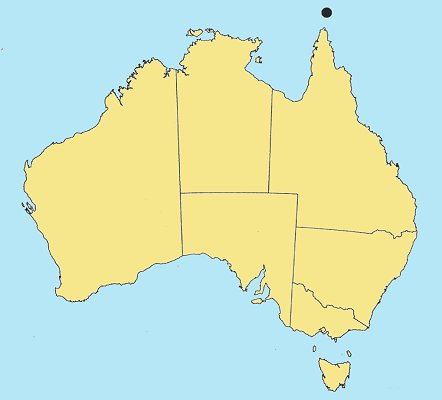Eulalia sp. A (Sabai Island J.R.Clarkson 7801)
Classification. (GPWG 2001) : Subfamily
Panicoideae. Andropogoneae.
Key references
(books and floras): [2002] D.Sharp & B.K.Simon, AusGrass, Grasses of
Australia (as E.sp.A).
Habit. Perennial.
Culms erect, 60–80 cm tall. Mid-culm nodes glabrous. Lateral branches simple.
Leaves basal and cauline. Ligule a fringed membrane, a ciliate membrane, 0.3 mm
long. Leaf-blades flat, 3–20 cm long, 1–2.5 mm wide. Leaf-blade surface
glabrous or indumented.
Inflorescence.
Inflorescence digitate, with ramose branches. Rhachis fragile at the nodes.
Spikelets.
Spikelets sessile and pedicelled, 2 in the cluster. Companion spikelets
developed. Fertile spikelets 2-flowered, the lower floret barren (rarely male),
the upper fertile, comprising 1 basal sterile florets, comprising 1 fertile
floret(s), without rachilla extension, lanceolate or elliptic, dorsally
compressed, 3–3.5 mm long.
Glumes. Glumes
dissimilar. Lower glume linear or lanceolate or oblong, coriaceous, keeled,
2-keeled, 2 -nerved. Lower glume surface indumented. Upper glume oblong,
keeled, 1-keeled, 3 -nerved. Upper glume surface glabrous. Florets.
Basal sterile florets 1, barren, without significant palea. Lemma of lower
sterile floret 50 % of length of spikelet, hyaline, 0 -nerved.
Fertile lemma 1.5 mm
long, without keel, 1 -nerved. Lemma apex lobed, awned, 1 -awned. Median
(principal) awn from a sinus, 5–7 mm long overall, without a column. Palea
absent.
Continental
Distribution: Australasia.
Australian
Distribution: Queensland.
Queensland:
Cook.

